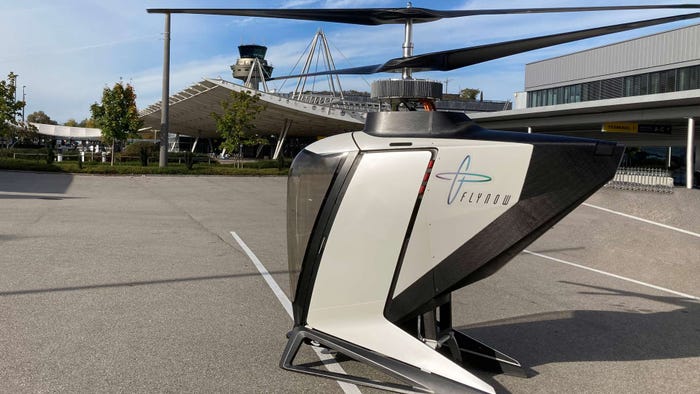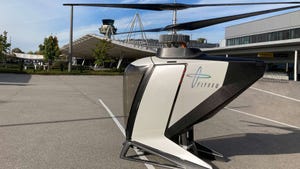Flying Taxi Startup Faces InsolvencyFlying Taxi Startup Faces Insolvency
The move was triggered by Lilium being denied a $54 million loan guarantee it was seeking from the government
.png?width=1280&auto=webp&quality=95&format=jpg&disable=upscale)
German electric vertical takeoff and landing (eVTOL) jet maker Lilium is facing insolvency as two of its subsidiaries apply for self-administered insolvency.
The move was triggered by Lilium being denied a $54 million loan guarantee it was seeking from the government of Bavaria.
A closing condition of committed private funding was for the German government to support a KfW bank loan.
When the support failed, Lilium was forced to file for self-administration.
“Our plan was to obtain shareholder investment in a new funding round anchored by a German government backed loan of $108 million,” said Lilium CEO Klaus Roewe. “We had already conditionally secured additional private capital to complement the KfW loan. However, the Budget Committee was unable to agree on the loan and Bavaria couldn’t do it alone.”
If approved by the court, self-administration aims to preserve and continue the business, leaving management in control and the business continuing operation, but under the supervision of a custodian.
During that time, the company could receive investments or it could sell the business or company assets.
For more flying vehicle and other embedded tech news subscribe to our free newsletter!
“In Germany, the procedure is generally perceived as providing an improved chance for a successful in-court business restructuring,” Lilium said in a statement.
Developing electric air taxi businesses has been a high cash burn-rate proposition.
Lilium had been in advanced discussions for a French government $237 million loan guarantee to finance a battery factory and an assembly line in France.
Lilium, UrbanV and Aeroports de la Cote d’Azur had planned to bring Lilium electric jet flights to the South of France starting in 2026.
The plan was to create a network to connect the French Riviera with Monaco, Nice, Cannes, Golfe de Saint-Tropez, Aix-en-Provence and Marseille.
While the short-term future of Lilium is unknown, the company has strong assets, primarily the knowledge of what it takes to get such a venture off the ground.
Lilium also has a relationship with Lufthansa Group and every leading airline needs a role in the electric aerial revolution, with airlines including Delta and United Airlines both heavily invested.
As a flying taxi developer, Lilium had one of the largest number of backorders for its electric aerial vehicles (EAV).
“We deeply regret the insolvency and its consequences for all stakeholders at such a crucial stage of our company’s development,” said Roewe. “However, while there is no guarantee for success in insolvency proceedings, we hope that the Lilium Jet will get a chance for a fresh start after the self-administration process is completed.”
“We strongly believe that electric flying is our best hope for the decarbonization of aviation.”
With orders or reservations for more than 780 Lilium electric jets, the company was expecting pre-delivery payments and new investment to finance the company into 2026. Orders were placed from operators in the U.S., South America, Europe, Asia and the Middle East.
During this period, the future status of those orders is unknown.
“Within the next few days, the company expects that the subsidiaries will file for insolvency in the competent court in Germany and apply for self-administration proceeding pursuant to Section 270(a) of the German Insolvency Code,” the company stated in its filing with the Security and Exchange Commission. “However, there can be no assurances that the applications for self-administration proceedings will be approved by the court.”
Earlier this month, Lilium completed the first power-on test of its MSN1 electric jet.
Lilium planned to fly six test EAVs up to type-certification and entry into service in 2026.
Lilium recently showed its electric jet at a Houston, Texas, airport with EMCJET, a Houston-based aircraft brokerage firm that plans to showcase the jet at Galaxy FBO (fixed base operator).
The eVTOL jet has an operating range of about 110 miles and would be capable of connecting routes such as Houston Hobby Airport to Galveston, Houston Spaceport to College Station and The Woodlands to Galveston.
The Lilium eVTOL craft is a jet, unlike most EAVs.
The seven-seater vehicles were planned as a regional air mobility service, connecting cities and towns up to 125 miles apart at speeds of up to 185 mph.
The flying vehicle features forward canards (small wings near the front) along with main wings and a distributed propulsion system with fixed landing gear without hydraulics.
The flying taxi maker has been arranging numerous partnerships as it was getting closer to 2025 test flights.
Lilium had an agreement to sell up to 100 Lilium electric jets to Saudia Group for delivery in 2026 and be managed and run by Saudia Private.
Lilium also had announced it was selling four jets to Volare Aviation subsidiary eVolare, one of the largest helicopter and private jet operators in the U.K.
Lilium also had teamed with a vertiport operator and an airport management company to create a vertiport network for EAVs in the French Riviera.
During takeoff, the EAV would use its 36 electric ducted fans to hover for up to 25 seconds and 20 seconds during the landing phase, according to the company. Most of the flight time would be in the cruise stage with a relatively short takeoff and landing time.
Lilium has teamed with the Lufthansa Group to explore opportunities in aviation including ground and flight operations, EAV maintenance and flight training in Europe.
The EAV maker is also teaming with jet and helicopter operator PhilJets to establish advanced air mobility (AAM) services in the Philippines and other Southeast Asia countries.
Read more about:
Flying CarsAbout the Author
You May Also Like


.jpg?width=700&auto=webp&quality=80&disable=upscale)





